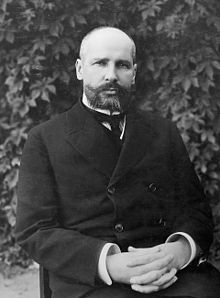Pyotr Stolypin | |
|---|---|
| Пётр Столыпин | |
 | |
| 3rd Prime Minister of Russia | |
| In office 21 July 1906 – 18 September 1911 | |
| Monarch | Nicholas II |
| Preceded by | Ivan Goremykin |
| Succeeded by | Vladimir Kokovtsov |
| Minister of Internal Affairs of Russia | |
| In office 26 April 1906 – 18 September 1911 | |
| Prime Minister | Ivan Goremykin Himself |
| Preceded by | Pyotr Durnovo |
| Succeeded by | Alexander Makarov |
| Personal details | |
| Born | Pyotr Arkadyevich Stolypin 14 April 1862 Dresden, Kingdom of Saxony, German Confederation |
| Died | 18 September 1911 (aged 49) Kiev, Kiev Governorate, Southwestern Krai, Russian Empire |
| Manner of death | Assassination |
| Resting place | Kyiv Pechersk Lavra, Ukraine |
| Nationality | Russian |
| Spouse | Olga Borisovna von Neidhardt |
| This article is part of a series on |
| Conservatism in Russia |
|---|
 |
Pyotr Arkadyevich Stolypin (Russian: Пётр Аркадьевич Столыпин, IPA: [pʲɵtr ɐrˈkadʲjɪvʲɪtɕ stɐˈlɨpʲɪn]; 14 April [O.S. 2 April] 1862 – 18 September [O.S. 5 September] 1911) was a Russian statesman who served as the third prime minister and the interior minister of the Russian Empire from 1906 until his assassination in 1911. Known as the greatest reformer of Russian society and economy, his reforms caused unprecedented growth of the Russian state, which was halted by his assassination.
Born in Dresden, in the Kingdom of Saxony, to a prominent Russian aristocratic family, Stolypin became involved in government from his early 20s. His successes in public service led to rapid promotions, culminating in his appointment as interior minister under prime minister Ivan Goremykin in April 1906. In July, Goremykin resigned and was succeeded as prime minister by Stolypin.
As prime minister, Stolypin initiated major agrarian reforms, known as the Stolypin reform, that granted the right of private land ownership to the peasantry. His tenure was also marked by increased revolutionary unrest, to which he responded with a new system of martial law that allowed for the arrest, speedy trial, and execution of accused offenders. After numerous previous assassination attempts, Stolypin was fatally shot in September 1911 by revolutionary Dmitrii Bogrov in Kiev.
Stolypin was a monarchist and hoped to strengthen the throne by modernizing the rural Russian economy. Modernity and efficiency, rather than democracy, were his goals. He argued that the land question could only be resolved and revolution averted when the peasant commune was abolished and a stable landowning class of peasants, the kulaks, would have a stake in the status quo. His successes and failures have been the subject of heated controversy among scholars, who agree he was one of the last major statesmen of Imperial Russia with cogent and forceful public reform policies.[1]
- ^ Ascher 2001, p. [page needed].